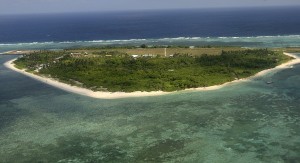Even as it continues to nurture longstanding ties with China, the Philippines will not back down from asserting its claims in the disputed West Philippine Sea (South China Sea) using international law and without resorting to force.
At a high-level gathering of United States and Philippine officials in Washington D.C. recently, Foreign Secretary Albert del Rosario said the West Philippine Sea is “a core national interest of the Philippines,” and the country would pursue its claims there within a framework of diplomacy, international law and cooperation.
And while China is one of the country’s biggest trading partners, the Philippines will push for its claims in the resource-rich territories within the West Philippine Sea, including part of the Spratlys, the Panatag Shoal and the Recto Bank.
“The West Philippine Sea remains a focus of concern for the Philippines, for the region and for the international community and as we have maintained many times before, a rules-based approach is the only legitimate and viable way to address the issue,” Del Rosario said in remarks at the Philippine Conference at the US capital last week.
Del Rosario spoke at the Sept. 26 conference which was sponsored by the Center for Strategic and International Studies (CSIS), a US nonprofit, and the US-Philippine Society, before addressing the United Nations General Assembly. Finance Secretary Cesar Purisima and Justice Secretary Leila de Lima also spoke at the event.
In the audience were Kurt Campbell, US State Department Assistant Secretary of State for East Asian and Pacific Affairs, and Philippine Ambassador to the United States Jose Cuisia.
In his speech, which was posted on the CSIS website, Del Rosario, the country’s former ambassador to the United States, welcomed US moves to boost its presence in the Asia Pacific.
“American attention is once again moving out east, towards the Western Pacific and the maritime margins of Eastern Asia,” he said.
Such a presence was “important to maintain the regional balance,” he said.
“The geostrategists would present this as part of the new US strategic pivot to Asia. Business leaders would argue that such a shift is logical given the increasing geoeconomic weight of East Asia. We, however, prefer to see this as America’s coming home,” he added, citing US history of naval presence in the region.
According to Del Rosario, the Philippines and China were in a “very challenging” period in their relations.
He said the West Philippine Sea issue does not constitute the sum total of the country’s relations with China.
He said that as the Philippines pushes for a peaceful resolution of the disputes, the country would build a “minimum credible defense posture” to safeguard territorial interest in the contested waters, assuring that such “posture is and will remain entirely defensive.”
“There is a wise saying that good fences make good neighbors. Drawing this to heart, the Philippines has been taking steps to build a minimum credible defense posture sufficient to defend the nation’s boundaries and sovereignty at sea,” said Del Rosario.
He reiterated that the Philippines “does not seek to isolate one country or even force the resolution of disputes.”
“Our core interest lies in being able to contribute in ensuring that global security and economic system is based firmly on the rule of law. We are firmly committed to helping build an international system that will be just and fair to all states regardless of econ size and power,” said Del Rosario.
